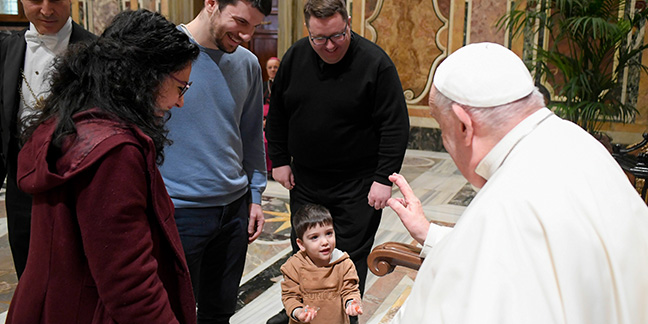 VATICAN CITY — When Catholics approach a church tribunal or canon lawyer, they "must always meet the face of our mother, the holy church, who loves all her children with tenderness," Pope Francis said.
VATICAN CITY — When Catholics approach a church tribunal or canon lawyer, they "must always meet the face of our mother, the holy church, who loves all her children with tenderness," Pope Francis said.
At the same time, "charity does not dissolve justice; it does not relativize rights. In the name of love, one cannot neglect the duty of justice," the pope told participants in a course offered by the Roman Rota, a Vatican-based tribunal dealing mainly with marriage cases.
Meeting participants Nov. 23, the pope said that addressing the legal and pastoral challenges regarding marriage and the family "is a vast apostolic field, but also complex and delicate, to which it is necessary to devote energy and enthusiasm, with the intention of promoting the Gospel of the family and life."
Members of tribunals and canon lawyers who assist and advise Catholics must exercise a "ministry of justice and charity in truth," Pope Francis said.
"You are called to love justice, charity and truth, and to strive daily to implement them in your work as canonists and in all the tasks you perform in the service of the faithful," he said. "It is a matter of loving all three at the same time, because they go together," and when one is disregarded, "the others lose their authenticity."
"Neither justice without charity, nor charity without justice," he said. Because "charity without justice is not charity."
Justice is the key virtue of giving each person what is his or her right, and it is a virtue as necessary in the church as in any human community, he said.
"However, in no human community, and even less so in the church, is it enough to respect rights; it is necessary to go beyond rights, with the zeal of charity, in search of the good of others through the generous gift of one's own existence," Pope Francis told the group.
As tribunal judges and canon lawyers exercise their legal duties, he said, they must remember that "people are to be treated not only according to justice, which is inescapable, but also and above all with charity."
In 2015, Pope Francis rewrote a section of canon law with the aim of making the Catholic Church's marriage annulment process quicker, less expensive and more pastoral. He told participants in the course that simplifying the process did not mean weakening a commitment to justice or to the truth about whether a valid marriage existed.
Church workers cannot be afraid of justice, "as though it could undermine or diminish charity," he said. "That fear stems from a mistaken conception of justice, thought of as a selfish and potentially conflictual claim," rather than as "an exquisitely altruistic virtue that propels toward the good of the other."
At the same time, he said, one cannot be "afraid of charity and of mercy as its characteristic expression.
"Charity does not dissolve justice," and "it does not relativize rights," the pope said.
Striving to be close to Catholics experiencing marital difficulties and trying to speed up the annulment process do not weaken the demands of justice," he said. Instead, "it urges us to live it more gently as the fruit of compassion toward our neighbor's suffering" since "mercy is the very foundation of the church's life."
— Cindy Wooden, Catholic News Service


